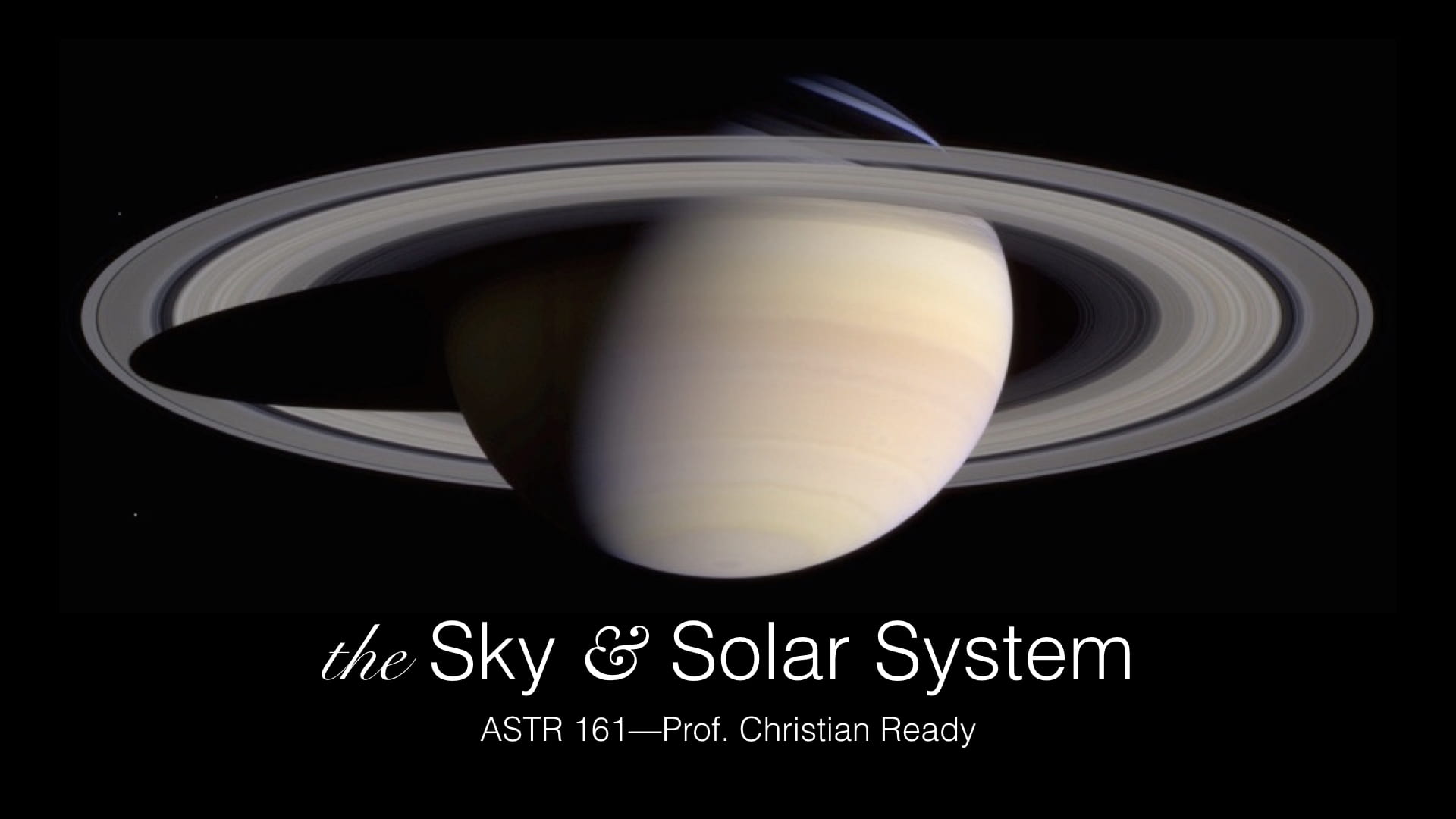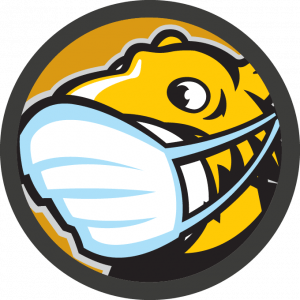
Schedule
| section | class | lab | ||||
|---|---|---|---|---|---|---|
| 003 | T,Th 11:00—12:15 | SC 2230 (PDF) | Prof. Ready | M 9:00—10:50 | SC 1141 (PDF) | Dr. Etchemaite-Walborn |
| 004 | M 12:00—1:50 | Dr. Requena Torres | ||||
Here’s when I’m around
My office is in the Science Complex, Room 4150M (see the map, it’s a labyrinth up there). I’ll try to make sure I’m in the office to chat with you in-person during these times:
| M | T | W | Th | F |
|---|---|---|---|---|
| 11:30—1:00 pm | 12:30—2:00 pm | 11:30—1:00 pm | 12:30—2:00 pm | 11:00—12:00 |
Drop-ins are welcome but it’s always a good idea to get in touch with me ahead of time so I can actually be there when you are. We can do a Zoom call pretty much any time outside of my in-person hours.
Description
ASTR 161 is an introduction to astronomy with a focus on the sky, our Solar System, and how it compares to other planetary systems. With a little curiosity, imagination, and some mathematical tools, you will understand how we come to know what we know about the universe, not just what we know.
Because this class is qualitative in nature, we’ll understand astronomy primarily in plain English, with the occasional equation to help us understand physical relationships 1.
Text and polling
This is a FREE, open source textbook provided by the OpenStax project. You may view the book online, download as a PDF, order a print version, purchase an Apple iBooks version, or download a free Kindle version.
(students register here).
Grading & Credit
Your final grade will use the TU +/- grading system and will be based on the following:
| Component | % Total | Notes |
|---|---|---|
| Celebrations of Knowledge (3) | 30% | because exam doesn’t sound fun; multiple choice; 10% each |
| Weekly Quizzes, Online | 20% | lowest score dropped, the rest are averaged |
| Classroom Participation | 20% | your total clicker response score as a fraction of the total clicker points possible (which in turn depends on how many poll questions were asked over the course of the semester) |
| Lab | 25% | lowest score dropped, the rest are averaged; mandatory for credit |
| Final Celebration | 5% | cumulative |
| Total | 100% |
Your final letter grade for the class will be based on the value of your final Class Score and assigned according to the following scale:
| A | 92.50–100.00 | C+ | 76.50–79.49 |
|---|---|---|---|
| A– | 89.50–92.49 | C | 69.50–76.49 |
| B+ | 86.50–89.49 | D+ | 66.50–69.49 |
| B | 82.50–86.49 | D | 59.50–66.49 |
| B- | 79.50–82.49 | F | 00.00–59.49 (but seriously, you really gotta want that F) |
Celebrations of Knowledge
We’ll have three exams celebrations of knowledge, each worth 10% of your final score, plus a final CoK that’s worth 5%. One (1) excused CoK absence can be made up. Unexcused CoK’s will receive a zero (0) score. Except in unusual circumstances, two missed examinations will result in failure of the course.
Weekly Quizzes
Each week, I’ll assign one or more quizzes (usually just one) on Blackboard. The purpose of these quizzes is to get you to review each week, and not the night before the exam. They may be attempted multiple times, and the highest scoring attempt submitted by the deadline is the one that gets recorded.
Late quiz submissions will not be accepted unless arrangements have been made prior to the due date/time of that particular quiz.
Throughout the semester your lowest quiz score is dropped, and 20% of the average of the remaining scores are added to your final score.
Classroom Participation
We will be using Poll Everywhere to record your responses to clicker questions. Each class (and some labs) will feature interactive questions. You’ll have some time to chat with your neighbor to determine the correct response. Points are awarded as follows:
- Correct: 3
- Incorrect: 2
- No response: 0
Responses are imported into Blackboard, and your final score is simply your total number of points as a percentage of the total points possible throughout the semester.
Although class attendance is not mandatory, if you miss a class, you will miss out on the points that were “up for grabs” that class session. Missed participation points will not be exempted unless arrangements have been made prior to the date of that particular class.
Lab
Although mainly designed to compliment what was covered in class, some labs may be used to introduce new topics. Lab experiments will be posted to Blackboard ahead of each session. All lab work is to be completed and turned in at the end of each lab session. Proper grammar is strongly encouraged 2.
Your final lab grade will be the average of all but your lowest-scoring lab and will account for 25% of your final grade. Note that failing the lab will result in an automatic failure of the class.
Tentative schedule
Every class is different so there’s no way I can guarantee we’ll hit every one of these topics on every one of these weeks. But to give you some idea of what to look for and when, here’s a possible schedule we might follow:
| Week | Topics (with relevant text chapter numbers) |
|---|---|
| 1/30 | Introduction 1.4 Numbers in Astronomy 1.5 Consequences of Light Travel Time 1.6 A Tour of the Universe 2.1 The Sky Above |
| 2/6 | 2.1 The Sky Above 2.2. Ancient Astronomy 2.4 The Birth of Modern Astronomy |
| 2/13 | 3.1 The Laws of Planetary Motion 3.2 Newton’s Great Synthesis |
| 2/20 | 3.3 Newton’s Law of Gravitation 3.4 Orbits in the Solar System |
| 2/27 | 3.5 Motions of Satellites and Spacecraft 4.1 Earth and Sky 4.2 Keeping Time 4.3 The Calendar 4.5 Phases of the Moon |
| 3/6 | 4.5 Phases and Motions of the Moon 4.6 Ocean Tides and the Moon 4.7 Eclipses of the Sun and Moon |
| 3/13 | Celebration of Knowledge 1 7.1 Other Worlds: An Introduction to the Solar System 7.2 Formation of the Solar System |
| 3/18 | Spring Break |
| 3/27 | 7.2 Formation of the Solar System 15. The Sun: A Garden-Variety Star |
| 4/3 | 15. The Sun: A Garden-Variety Star 8 Earth as a Planet |
| 4/10 | 9 Cratered Worlds 10. Earthlike Planets: Venus and Mars |
| 4/17 | 10. Earthlike Planets: Venus and Mars Celebration of Knowledge 2 |
| 4/24 | 11. The Giant Planets 12. Rings, Moons, and Pluto |
| 5/1 | 12. Rings, Moons, and Pluto 13. Comets and Asteroids: Debris of the Solar System |
| 5/8 | 13. Comets and Asteroids: Debris of the Solar System Celebration of Knowledge 3 |
| 5/15 | Final Celebration Thursday 5/19 12:30—2:30 |
Conduct
be excellent to each other
I can’t believe I have to write this, but bullying, distracting comments, trolling, and acting like a jerk will not be tolerated. The penalty for inappropriate behavior will be determined by me and may include failure and/or removal from the class.
stay on target
Please come to class prepared to learn. As a courtesy to me and your fellow students, do not read extraneous materials, use the computers for non-class purposes, or fiddle with electronic gadgets while you are in class 3.
So turn off your phone—or at the very least, set it to vibrate—when you come to class. Thanks.
 mask up
mask up
KN95 or better. I’m not happy about it either, but given the situation we find ourselves in, we’re keeping them on during classes until directed otherwise.
The University has set clear expectations about mask wearing for the safety of all in our community. Face coverings over the nose and mouth are required at all times while indoors. There are no exceptions to this rule. Students not wearing a mask—or wearing a mask improperly—will be asked to wear a mask or to fix their mask position. Any student refusing to put on or wear a mask will be asked to leave the classroom immediately. Students who have additional incidents with the mask expectation after a first warning will be referred to the Office of Student Conduct for failure to comply with this University directive.
Academic Integrity
If you’re thinking about cheating, forget it. Cheating on Celebrations of Knowledge (examinations), labs, or any other aspect of the course will result in a penalty. The penalty for cheating will be determined by me and may include failure of the course and the reporting of the incident to the Vice President for Student Life.
Late/Missed Assignments
Assignments, including (but not limited to) labs, will be accepted late on a case-by-case basis if notice is given prior to the due date of the assignment.
Copyright
My lectures and course materials, including, but not limited to Keynote presentations, PDFs, tests, outlines, and similar materials, are protected by copyright. I am the exclusive owner of copyright in those materials I create. You may take notes and make copies of course materials for your own use; however, you may not, nor may you allow others to, reproduce or distribute lecture notes and course materials publicly whether or not a fee is charged without my express written consent.
And yes, that includes uploading stuff to sites like Chegg, CourseHero, etc.
Diversity
The Department of Physics, Astronomy and Geosciences (PAGS), in accordance with the Fisher College of Science and Mathematics (FCSM) and with the Towson University Strategic Plan, support initiatives that promote diversity among FCSM faculty, staff and students. We are committed to increasing the quality and diversity of our students, faculty and staff while increasing retention and curriculum initiatives. To obtain further information related to diversity initiatives, please visit:
footnotes
- Relax, it’s nothing you haven’t done before, and you’ll have plenty of opportunities to break the rust off if you haven’t done any math in a while. We’re talking basic algebra and below so don’t stress. ↩
- Oddly enough, the easier it is for me to actually read your lab, the easier it is for me to grade it. I know, weird, right? ↩
- Except when using clickers, in which case fiddle away. ↩

